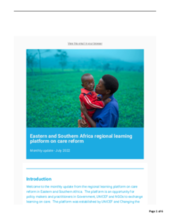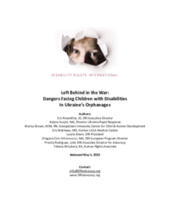In this workshop Family for Every Child members Flüchtlingsrat Niedersachsen (The Refugee Council of Lower Saxony, Germany), Programma Integra (Italy) and METAdrasi (Greece) share their experience around supporting unaccompanied minors, with For Our Children (FoC) in Bulgaria. They share top tips with FoC as they navigate the arrival of unaccompanied minors fleeing the conflict in Ukraine, and find ways to support them.
This is a recording of the first session in a webinar series celebrating the launch of of a themed issue of Global Childhood Studies journal (Volume.2; Issue.1). This first webinar focuses on Responding to varied experiences of childhood separation.
The Task Force on Foster Care of the Transforming Children's Care Global Collaborative Platform held the third webinar in the spotlight series on Foster Care Practice on 2 June 2022.
This is the monthly update of the Eastern and Southern Africa Regional Learning Platform published in June 2022.
This session on the central role of social protection in tackling child labour took place as part of the 5th Global Conference on Child Labour in Durban, South Africa, on May 18, 2022.
This webinar presents the findings from the stage one analysis of the legal, policy and procedural frameworks of orphanage trafficking in Cambodia, Uganda, and Nepal. It also featured presentations on the situation of orphanage trafficking from in-country investigators and experts.
The Eastern and Southern Africa Regional Learning Platform hosted a webinar on 11 May 2022 examining why it is important to align care systems in development and humanitarian contexts and provides practical examples from Kenya and Uganda.
There were an estimated 100,000 children in Ukraine’s institutions before Russia’s war on Ukraine which began in February 2022.
The Task Force on Foster Care of the Transforming Children's Care Global Collaborative Platform held the second spotlight webinar series on identifying foster carers on 5 May 2022.
The Eastern and Southern Africa Regional Learning Platform hosted a webinar on April 13, 2022, featuring a panel of people with lived experience in care.


